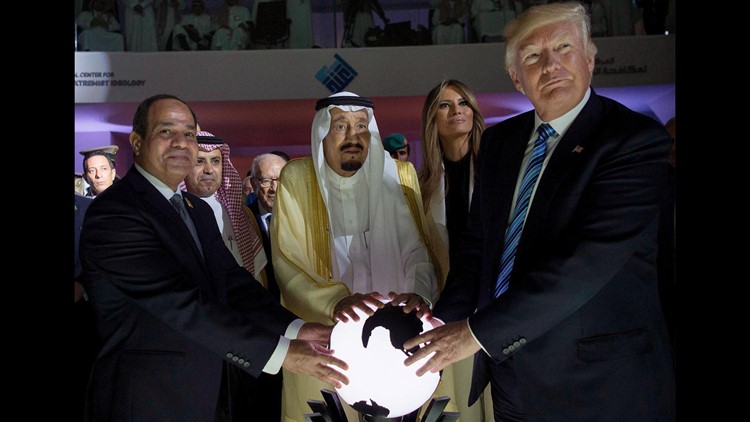President Donald Trump landed in Israel on Monday for the second leg of his first foreign trip as president where he will tackle the Israeli-Palestinian peace process, address regional security issues and reaffirm the US’ commitment to its alliance with Israel.
The visit is the second of three stops on the President’s schedule aimed at highlighting the importance of the world’s three largest monotheistic religions. He arrived in Israel after visiting Saudi Arabia, home to the two holiest sites in Islam, and will next head to the Vatican, home of the Catholic Church.
Of course, Trump has quite the busy schedule while overseas:
After landing in Tel Aviv, Trump will head to Jerusalem for a series of meetings, speeches and symbolic visits.
Day 1:
Meets with Israeli President Reuven Rivlin Visits the Church of the Holy Sepulcher Visits Western Wall Meets with Israeli Prime Minister Benjamin Netanyahu
Day 2:
Travels to the West Bank city of Bethlehem to meet with Palestinian Authority President Mahmoud Abbas Visits Israel’s Holocaust museum, Yad Vashem, to lay a wreath Delivers remarks at the Israel Museum
Obviously, this trip could impact foreign relations in a number of ways.
Are there US-Israeli tensions over Trump’s revelation to Russians?
This is an unexpected cloud that may hang over Trump’s visit. It comes a week after the US alliance with Israel was put to the test amid reports that Trump divulged highly classified intelligence obtained by the Israelis during his meeting with the Russian foreign minister.
The US-Israeli intelligence cooperation agreement is one of the most significant relationships in the world and Trump’s decision to reveal information the Israelis did not want shared could make for tension during Trump’s visit.
Neither the US nor Israel have confirmed the source of the intelligence was indeed Israel, as widely reported, but the Israelis have publicly refuted any talk of friction in the relationship. Israeli Ambassador to Washington Ron Dermer reaffirmed Israel’s “full confidence in our intelligence sharing relationship” after the bombshell revelation.
Asked if Trump planned to apologize for sharing the Israeli intelligence, Secretary of State Rex Tillerson said Monday aboard Air Force One en route to Tel Aviv: “I don’t know that there’s anything to apologize for.”
“To the extent the Israelis have any questions, or clarification, I’m sure we’re happy to provide that,” Tillerson said.
After that, the Israeli-Palestinian conflict will be at the top of the President’s agenda as he meets with leaders from both sides. Trump, for his part, has ramped up expectations, expressing his optimism that a peace deal can finally be brokered to end the nearly 70-year-old conflict and even suggesting a resolution may not be so difficult to obtain after all.
“It is something that I think is, frankly, maybe, not as difficult as people have thought over the years,” Trump said last month during a meeting with Abbas.
Trump and his advisers have made reviving peace talks between the Israelis and Palestinians a top foreign policy priority and the US president will be looking to demonstrate some progress toward that goal on the other end of the trip.
Trump has pitched himself as a “mediator, an arbitrator or a facilitator” to help both sides to reach a lasting peace settlement and has resisted laying out specific conditions for a peace deal.
Trump shocked longtime observers of the Israeli-Palestinian peace process earlier this year when he declined to endorse a two-state solution to the conflict, breaking with stated US policy under his past two predecessors Presidents George W. Bush and Barack Obama.
“I’m looking at two-state and one-state, and I like the one that both parties like,” Trump said during a joint news conference with Netanyahu at the White House in February. “I’m very happy with the one that both parties like. I can live with either one.”
Tillerson said the administration believes that the increasing threat of Islamist extremism is proving to be a unifying force.
“That is unifying,” Tillerson said. “That there’s something larger going on that’s affecting all of us. We need to try and come together to address that. I think that creates a different dynamic.”
While aiming to do all the positive things is a goal of the President, things don’t always go as planned.
Our question is, do you think President Trump’s trip abroad have a positive impact on foreign relations?



